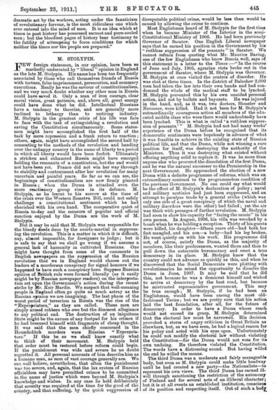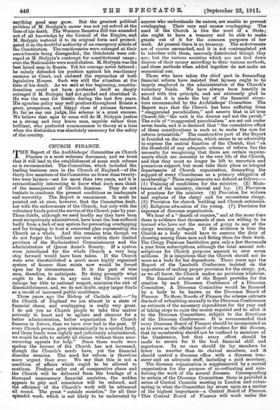M. STOLYPIN.
FEW foreign statesmen, in our opinion, have been so markedly underrated by " liberal " opinion in England as the late M. Stolypin. His name has been too frequently associated by those who call themselves friends of Russia with torture, false imprisonment, persecution, and summary executions. Really he was the saviour of constitutionalism. and we very much doubt whether any other man in Russia could have saved it. Only a man of iron courage, clear moral vision, great patience, and, above all, great energy could. have done what he did. Intellectual Russians have a tendency to theorize, and are generally more inclined to lethargy than to untiring industry. M. Stolypin in the greatest crisis of his life was face to face with the task of extinguishing a revolution and saving the Constitution simultaneously. Some states- men might have accomplished the first half of the task by mere repression and a frank return to reaction ; others, again, might have accomplished the second half by consenting to the methods of the revolution and handing over the unhappy country in the name of liberty to a period in which all liberty would have been forfeit. Ultimately a stricken and exhausted Russia might have emerged holding the remnants of a constitution, but the end would not have been yet. France did not win her way through to stability and contentment after her revolution for many uncertain and painful years. So far as we can see, the beginnings of constitutionalism are now firmly planted in Russia ; when the Duma is attacked even the more reactionary group rises in its defence. M. Stolypin, as he learnt to his sorrow at the time of the crisis over the Western Zemstva Bill, could not safely challenge a constitutional sentiment which he had cherished with his own hand. The comparative quiet of Russia to-day and the measure of popular and official sanction enjoyed by the Duma, are the work of M. Stolypin.
But it may be said that M. Stolypin was responsible for the bloody deeds done by the courts-martial in suppress- ing the revolution. This is a matter in which it is difficult, nay, almost impossible, for foreigners to judge ; but it is safe to say that we shall go wrong if we assume a general lack of humanity in cultivated Russians. One might have thought from some of the comments in English newspapers on the suppression of the Russian revolution that we in England would choose out the leaders of a murderous conspiracy for signal honours if we happened to have such a conspiracy here. Suppose Russian opinion of British rule were formed literally (as it easily might be by Russian newspaper readers) on the interpreta- tion set upon the Government's action during the recent strike by Mr. Heir Hardie. We suspect that well-meaning people in England often go quite as much astray as the Russian opinion we are imagining. The last phase of the worst period of terrorism in Russia was the rise of the "Expropriators," as they are called. These men are simply armed robbers who owe but the dimmest allegiance to any political end. The destruction of an iniquitous State might be the excuse of any footpad for his crimes if he had bemused himself with fragments of cheap thought. It was said that the men chiefly concerned in the Houndsditch murders were Russian " Expropria- tors." If this be so we shall know exactly what to think of their movement. M. Stolypin held that order must be restored before reform could begin. If the punishment was wide and severe he no doubt regretted it. All personal accounts of him describe him as a humane man, as men of vast courage generally are. We can well believe, nevertheless, that often the punishment was too severe, and, again, that the lax system of Russian officialdom may have permitted crimes to be committed in the name of justice which were beyond M. Stolypin's knowledge and wishes. In any case he held deliberately that severity was required at the time for the good of the countg, and that suffering, by the quick suppression of disreputable political crime, would be less than would be caused by allowing the crime to continue. Most Englishmen heard of M. Stolypin for the first time when he became Minister of the Interior in the semi- Constitutional Ministry of 1906. He had been previously Governor of Saratov. One English Liberal newspaper says that he earned his position in the Government by his '• ruthless suppression of the peasants " in Saratov. We cannot refrain from quoting what Mr. Maurice Baring, one of the few Englishmen who know Russia well, says of this statement in a letter to the Times :—" In the course of June and July, 1905, agrarian riots broke out in the government of Saratov, where M. Stolypin was Governor. M. Stolypin at once visited the centres of disorder. He was shot at three times. In the district of Balashev 2,000 men had taken the law into their own hands and had con- demned the whole of the medical staff to be lynched. M. Stolypin prevented this by his own unaided personal action, and not by bullets and bayonets. He was injured in the hand, and, as it was, two doctors, Shmelev and Nevzorov, were killed. Had it not been for M. Stolypin's extraordinarily courageous action all members of the edu- cated middle class who were there would undoubtedly have been lynched. This is what is called a ruthless suppres- sion of peasants.' " M. Stolypin had not had many weeks' experience of the Duma before he recognized that its democratic sentiments were hopelessly in advance of what it was feasible to achieve in the existing state of Russian political life, and that the Duma, while not winning a sure position for itself, was destroying the authority of the Ministers. Thus it was destroying what existed without offering anything solid to replace it. It was he more than anyone else who procured the dissolution of the first Duma, and he was the natural successor to the Premiership in the next Government. He approached the election of a new Duma with a definite programme of reforms, which was an extraordinary contrast to the programmeless condition of the previous Government. No one could say what would be the effect of M. Stolypin's declaration of policy ; naval and military mutinies had just been suppressed, and an attempt to paralyse trade by a general strike (which was only one side of a great conspiracy of which the naval and military disorders were the other) had failed ; yet the air was thick with presages of further revolution. M. Stolypin had soon to show his capacity for "facing the music" in his own person. In August, 1906, his villa was wrecked by a bomb when he was holding a reception. Thirty of his guests were killed, his daughter—fifteen years old—had both her feet mangled, and his son—a baby—had his leg broken. He went quietly on with his work. His programme did not, of course, satisfy the Duma, as the majority of members, like their predecessors, wanted there and then to pull down the autocratic bureaucracy and erect a true democracy in its place. M. Stolypin knew that the country could not advance so quickly as this, and when he discovered that the Social Democrats were plotting with revolutionaries he seized the opportunity to dissolve the Duma in June, 1907. It may be said that he did this, not because he was a democrat himself and wished to arrive at democracy by the best road, but because he mistrusted representative government. This may be true enough ; M. Stolypin, if he had been an Englishman, would have been among the most old- fashioned Tories ; but we are pretty sure that his action laid the best foundation, after all, for the future of democracy. In order to have a Duma whose reach would not exceed its grasp, M. Stolypin determined that the electoral law must be narrowed. His decision provoked a storm of angry criticism in Great Britain as elsewhere, but, as we have seen, he had a logical reason for his policy and acted with his eyes open. Unfortunately he could not modify the electoral law without violating the Constitution—for the Duma would not vote for its own undoing. He therefore violated the Constitution. The words have a distressing sound. But having willed the end he willed the means.
The third Duma was a moderate and fairly manageable body, but even so M. Stolypin could make little headway until he had created a new party—the Nationalists—to represent his own views. The third Duma has earned ill- will through sanctioning the restriction of the autonomy of Finland and for several acts of an illiberal character; but it is at all events an established institution, conscious of its position and respecting itself. Out of such a bok anything good may grow. But the greatest political problem of M. Stolypin's career was not yet solved at the time of his death. The Western Zemstva Bill was amended out of all knowledge by the Council of the Empire, and M. Stolypin restored it to its original form and promul- gated it on the doubtful authority of an emergency article of the Constitution. The reactionaries were outraged at their amendments being disregarded; the Octobrists were out- raged at M. Stolypin's contempt for constitutional usage ; even the Nationalists were much shaken. M. Stolypin was the best hated man in Russia. Yet his courage never faltered ; he calmly defended his position against his reactionary enemies at Court, and endured the reproaches of both legislative Houses. Such was still the situation at the time of his death. As we said at the beginning, constitu- tionalism could not have professed itself so deeply outraged if M. Stolypin had not guided and cherished it. He was the man for Rusiia during the last five years. His agrarian policy may well produce throughout Russia a great, prosperous, and happy class of yeoman farmers. So far as one can judge, the scheme is a great success. We believe that ages to come will do M. Stolypin justice as a strong and very brave man, capable rather than brilliant, who preferred commonsense to theory at a time when the distinction was absolutely necessary for the safety of the country.







































 Previous page
Previous page